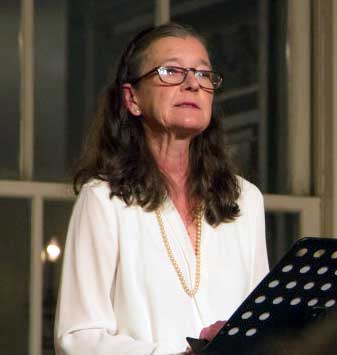Play
by Savyon Liebrecht
Translated by Anthony Berris
Directed by Guy Ben-Aharon
Israeli Stage
Goethe-Institut
Back Bay, Boston
September 20, 2015
With Nancy E. Carroll

“Porcelain Bowl With Strawberries” (c. 1620)
A woman married to a Nazi administrator at an extermination camp in Poland, likely Auschwitz but unnamed, has been kept from knowing details about what happens there. She gradually begins to make some inferences as she focuses vividly on an encounter with an interned Jewish girl with a shaved head who delivers juicy, oddly oversized, strawberries that she has grown in some particularly fertile soil in the camp.
Nancy E. Carroll gives a vivid and evocative reading of this suggestive and moving play by the contemporary Israeli playwright, Savyon Liebrecht. Nuanced and expressive without being either distant or maudlin, Carroll’s performance captures the ignorant curiosity of this character, rendering a psychologically compelling account, even though one may question the historic likelihood of its protagonist’s professed naivete.

Photo: Courtesy of Israeli Stage
By poetically exploring the gradual process of revelation about the horrors of a death camp, playwright Liebrecht has forged a hybrid of historical and psychologically-metaphoric approaches.
One wonders whether such apparently unknowing wives of Nazis at Auschwitz existed, and whether living on the edge of such a place one could subsist without being at least severely suspicious of the horrors that went on inside. One certainly wonders, as well, whether there are documented accounts by such women about their coming to consciousness about these atrocities.
Certainly, with regard to someone as forthrightly inquisitive as the central character of this play, one easily doubts how it might have been to dodge the evidence of mass killings.
But that, it seems, is the particular terrain Liebrecht wants to explore. Whether it is historically accurate seems less relevant to the project than the narrative exploration of what it would be like for someone to come to the awareness of such atrocities at any point.
That the focal character is a woman does give somewhat greater plausibility to the thesis that ignorance of the horrors was possible. The woman talks about her husband’s refusal to discuss what happens inside the factory, and we simply get the progressive revelations and suspicions of this female character as bits of information begin to appear. Through her account of the “strawberry girl,” in particular, we receive the impact of the woman’s initial outrage at a single child’s condition, while not yet drawing a connection between that and the role her husband plays.
The grave punch line of the show – essentially the story of the fertilizing of the strawberries – is powerful and forceful.

Playwright
Despite its combined historical-metaphorical stance, this narrative has enough history in it to fit a bit too easily into the we never knew what was happening claim of so many Germans after the war.
Though the character appears to be sincerely in the dark, one honestly wonders whether there is more of story to be told about self-deception than Liebrecht offers. The way The Strawberry Girl‘s narrative unfolds, no such suggestion is seriously put forth; it makes its case for revelation of horrible facts to a naive protagonist, rather than uncovering, in that protagonist, the semi-conscious hiding by oneself from the evidence around and about that would have provided clearer awareness of what was going on.
This self-deception route, frankly, seems more apropos, but, even so, playwright Liebrecht here gives an account which, even if it does not ring true historically, yields a psychologically penetrating story about the realization of what horrific human behavior is about.
Whatever one might feel about the perspective of the narrative, director Guy Ben-Aharon and actor Nancy Carroll have certainly honored the spirit of this text with a moving and evocative reading. Carroll’s austerity, directness and salty stoicism give a tragic integrity to this character, which makes the potent focal revelation of its core metaphor reverberate broadly and painfully.
– BADMan
Leave a Reply